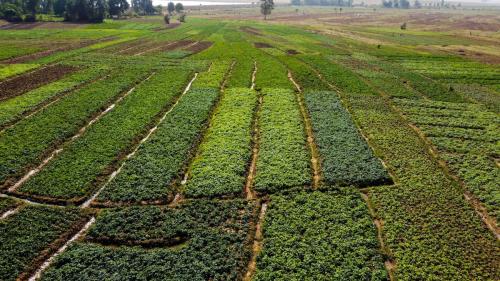

12:00 pm EDT - 1:30 pm EDT
Past Event
On Monday, April 27, the Africa Growth Initiative (AGI) at Brookings, in cooperation with the House Committee on Foreign Affairs, the Partnership to Cut Hunger and Poverty in Africa, and the Chicago Council on Global Affairs, hosted a briefing on the state of food security in Africa, current U.S. efforts to address the problem, and the existing challenges of and the priorities for American food security legislation. The panel included: Daniel Karanja, executive director of the Partnership to Cut Hunger and Poverty in Africa; Emmy Simmons, AGree co-chair; Ann Vaughan, director of policy and advocacy for Mercy Corps; and Connie Veillette, Lugar Center fellow. Joan Condon, senior professional staff member on the House Committee on Foreign Affairs, moderated the discussion. AGI Director and Brookings Senior Fellow Amadou Sy opened the discussion and provided framing remarks.
This event was part of the Africa Policy Dialogue on the Hill series, a regular congressional briefing series hosted by AGI on topical issues relevant to Africa’s growth and security. The April 27 discussion centered on the priorities for global food security legislation for the United States. One example of such legislation is Global Food Security Act of 2015 (H.R. 1567), which proposes “to authorize a comprehensive, strategic approach for United States foreign assistance to developing countries to reduce global poverty and hunger, achieve food security and improved nutrition, promote inclusive, sustainable agricultural-led economic growth, improve nutritional outcomes, especially for women and children, build resilience among vulnerable populations, and for other purposes.”
The panelists emphasized that global food security is different from humanitarian aid.
A significant part of the discussion on April 27 concerned the idea of what “food security” really means. The World Health Organization defines food security as “when all people at all times have access to sufficient, safe, nutritious food to maintain a healthy and active life.” As such, the panelists emphasized that global food security is different from humanitarian aid. One panelist noted that in areas where 90 percent of the population lives under the poverty line, providing food aid once a year is not a viable solution. There is a need to help farmers achieve sustainable revenues, diversify their income sources, and move from relief to resilience.
Panelists also spent some time identifying several challenges to achieving food security in Africa and exploring recommendations to address them. One panelist emphasized that a lack of functioning institutions that support agricultural development impedes the efforts towards achieving global food security, unlike in Asia where those institutions were in place to sustain its “green revolution.” Another panelist noted that lack of access to markets is a significant obstacle to African farmers: Though African agriculture is often labeled as “subsistence agriculture,” the percentage of farmers who rely on their agricultural output for subsistence is rather minimal. In fact, many farmers sell their output to survive. Therefore, farmers need the market for their livelihoods, but, as many panelists pointed out, they often have difficulties accessing local or international ones.
Another major theme of the conversation was that global food security is not only important in relieving poverty and improving livelihoods around the world, but also benefits the United States in many ways.
Another major theme of the conversation was that global food security is not only important in relieving poverty and improving livelihoods around the world, but also benefits the United States in many ways. As some panelists noted, the United States imports the majority of its domestically consumed agricultural products; thus, there is a need to ensure the safety of said products: Contaminated imported agricultural crops threaten the health of Americans. The U.S. currently has high safety standards for agricultural imports, meaning that some African countries have trouble exporting to the U.S. If the U.S. could enhance capacity to comply with these measures sanitary standards, food security, trade, and economic development on the continent could dramatically improve. Additionally, global food markets are very valuable the U.S.: American consumers benefit from having increased access to products.
Additionally, panelists emphasized that policies must aim to include women and youth, as these groups represent an important portion of the agricultural work force and can generate great opportunities for agriculture.
The panelists also discusses the various initiatives the U.S. already has in place to fight global food insecurity and related obstacles. One of which, Feed the Future, which launched in 2010, aims to fight food insecurity by working hand-in-hand with countries to develop their agricultural sector and reduce poverty and hunger. The program is implemented through a multiagency effort. One panelist stated that Feed the Future has achieved noticeable results. Still, as many panelists stressed, the challenge of global food security requires an extended, sustained approach. Additionally, panelists emphasized that policies must aim to include women and youth, as these groups represent an important portion of the agricultural work force and can generate great opportunities for agriculture. Another panelist reiterated the need for infrastructure investment, like roads and telecommunications facilities. The panelists also discussed the effectiveness of the African Growth and Opportunity Act, as it was originally created to boost exports from African nations, from which many eligible products are agricultural. The main issue the panelists raised about AGOA was the limited utilization of the program’s benefits and the need to boost agricultural exports.
Finally, panelists noted the importance of coordination across U.S. government agencies. Programs are often implemented by several government agencies. For example, Feed the Future has 11 implementing agencies, including USAID, USDA, the Millennium Challenge Corporation, and the Peace Corps, among others. To address coordination challenges, some panelists emphasized the positive role that the U.S. Congress could play in enhancing the partnership among U.S. agencies involved in food security programming.

Chipo Dendere, Miles Tendi
July 14, 2025

H.E. Julius Maada Bio, H.E. Seyi Makinde, Simeon K. Ehui, Hafez Ghanem
July 14, 2025

Eduardo Levy Yeyati
July 10, 2025